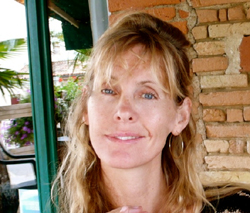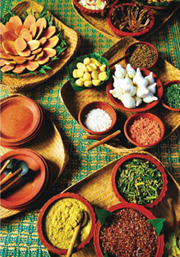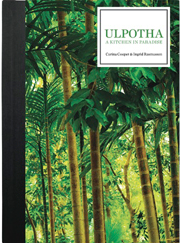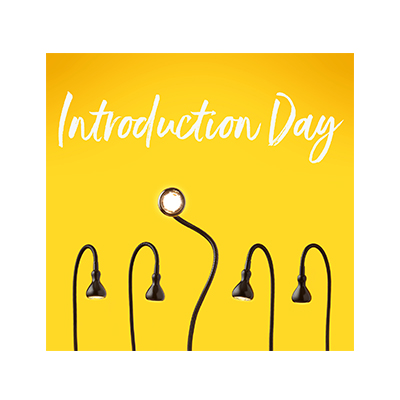Carina Cooper is a chef who has written regularly for Harpers and Queen magazine and the Evening Standard, as well as being the successful author of ‘Notting Hill Cook’ and ‘The After Work Cook’. She did the Hoffman Process in August 2004.
Making Peace with the Past
 I first came across the Process when I met the Hoffman UK founder, Tim Laurence. He was running an Enneagram workshop that I’d enrolled in; an experience which just blew me away. In fact, I was so impressed with the Enneagram’s approach to self-development that I started training in it myself. That took me to a point of self-awareness where I felt that the Hoffman Process was the logical next step.
I first came across the Process when I met the Hoffman UK founder, Tim Laurence. He was running an Enneagram workshop that I’d enrolled in; an experience which just blew me away. In fact, I was so impressed with the Enneagram’s approach to self-development that I started training in it myself. That took me to a point of self-awareness where I felt that the Hoffman Process was the logical next step.
People sometimes think that the Process is a magic bullet that will ‘fix’ them but I don’t consider that to be true of any course. It did, however, represent a hugely important stage of my personal development. It gave me the chance to find forgiveness for my parents, which gave me closure on my parental story. By the end of the Process I could see my story as a pattern like a jigsaw puzzle. I saw the part that each person in my family had played through the generations and I finally understood why they were the way they were.
I don’t think I’ve ever laughed or cried so much in my life as I did on the Process. It was so much fun. I left the course seeing the world with such wonder. The windows of my eyes felt polished clean. As I left I was full of love and enthusiasm. I looked up and saw a rainbow which seemed to signify a fresh start. It was my first experience of feeling that vibrational high which I’ve felt many times since.
Once I returned home I found that I was able to be more compassionate. Now I’d stopped blaming my parents and dropped my attachment to an ideal of how they ‘should’ have been, my relationship with my father was transformed. I also found peace in my relationship with my mother who was schizophrenic and who had taken her own life when I was young. I no longer look back at how I suffered as a child – I’m much more focused on the present.
The Buck Stops with Us
When you consider what traumas the previous generations went through, with world wars and daily survival issues, it’s unsurprising if they carry a lot of baggage. They didn’t have access to tools like the Hoffman Process, so I feel that it’s up to us to release the generational patterns and give more of a free rein to our children. The Process definitely made me more aware of my behaviour around my children; to be more present with them and listen to them more. I’ve found that the healthier you become, emotionally speaking, the more people react differently to you.
The Process also made me aware of the importance of caring for myself, which meant that I was even more determined to eat healthily. I’d first discovered my love of cooking in my 20s. It makes me feel very present and in touch with myself and it’s a way of sharing my love with others. I’ve become a vegetarian in the last couple of years and, since I’ve moved out of London. I buy only local food grown within 30 miles of Totnes or home-grown food from my kitchen garden. I also find that expressing thanks for a meal is very important – it makes you mindful, so you feel a sense of gratitude for the food. I feel that your body really is a temple and honouring your food is a way to remember that.
Sunny Foods, Sunny Thoughts
 I feel strongly about the quality of our food because it represents our life force. Do you want ‘dead’ food or ‘live’ food fuelling you? We are so addicted to sugar which exhausts our adrenals. If you can avoid eating too much dead food which can encourage you to overeat without feeling nourished and eat more live food, especially sun-ripened food that gives you solar power, then you’ll find that you need smaller quantities. You can feel live food go zing in your body. People in cities are often tired and jaded and part of that often stems from the lack of freshness in the food they eat. I’m pleased that they have now shown that organic food really is better for you. Unlike plants that have been sprayed, it has been allowed to develop a healthy immune system fighting pests and naturally-occurring infections. That means more phenols which means in turn more free radicals – the aspect of food that helps us fight disease and ageing.
I feel strongly about the quality of our food because it represents our life force. Do you want ‘dead’ food or ‘live’ food fuelling you? We are so addicted to sugar which exhausts our adrenals. If you can avoid eating too much dead food which can encourage you to overeat without feeling nourished and eat more live food, especially sun-ripened food that gives you solar power, then you’ll find that you need smaller quantities. You can feel live food go zing in your body. People in cities are often tired and jaded and part of that often stems from the lack of freshness in the food they eat. I’m pleased that they have now shown that organic food really is better for you. Unlike plants that have been sprayed, it has been allowed to develop a healthy immune system fighting pests and naturally-occurring infections. That means more phenols which means in turn more free radicals – the aspect of food that helps us fight disease and ageing.
If we can read its language, nature shows us by the shape and colour of food what part of our body it nourishes. For example olives are good for the ovaries and celery is good for bones, cauliflower is important for the lungs, avocado for the womb and figs for the testicles. I particularly love herbs as they are nature’s medicine chest and, even if you live in a city, growing herbs in a window box is easy. For me, food without herbs is like Christmas without lights!
I feel the most important ingredient in any dish is the love with which you prepare it – it passes on through the food. So really life’s not about becoming a cordon bleu chef, it’s about becoming a more loving human being.
 Carina’s new recipe and photographic book, ‘Ulpotha – A kitchen in paradise’ will be available from Amazon and most good bookshops from December. It celebrates a traditional village nestled in the heart of Sri Lanka’s cultural triangle, which has been a pilgrimage site for thousands of years. The villagers welcome guests six months a year to do yoga, eat Ayurvedic food and have Ayurvedic treatments. The book is lavishly illustrated by photographer Ingrid Rasmussen.
Carina’s new recipe and photographic book, ‘Ulpotha – A kitchen in paradise’ will be available from Amazon and most good bookshops from December. It celebrates a traditional village nestled in the heart of Sri Lanka’s cultural triangle, which has been a pilgrimage site for thousands of years. The villagers welcome guests six months a year to do yoga, eat Ayurvedic food and have Ayurvedic treatments. The book is lavishly illustrated by photographer Ingrid Rasmussen.
For information on her Enneagram workshops email Carina
Interview with Nikki Wyatt






 Sign up to receive monthly newsletters from Hoffman
Sign up to receive monthly newsletters from Hoffman